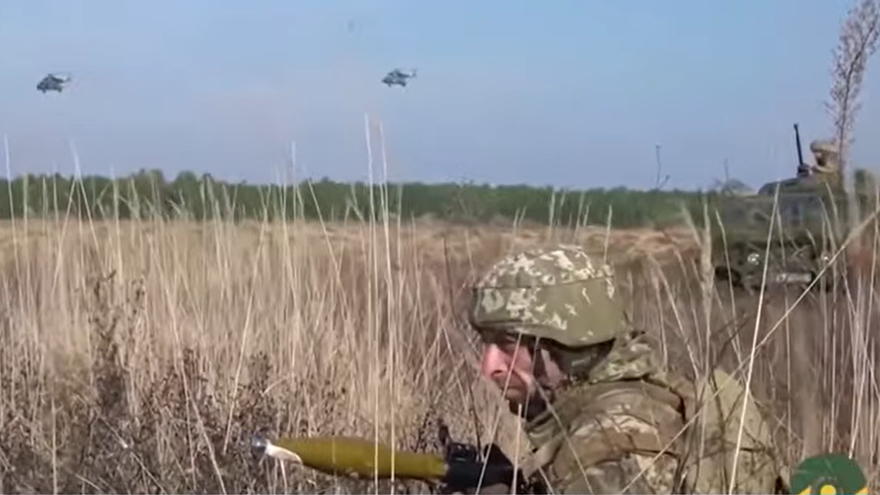
![]() 14ymedio/EFE, Havana/Moscow, 13 January 2022 — Russia has upped the stakes in its standoff with the West and warned that it is not ruling out a military deployment in Cuba and Venezuela if the United States ramps up pressure on the Ukraine issue.
14ymedio/EFE, Havana/Moscow, 13 January 2022 — Russia has upped the stakes in its standoff with the West and warned that it is not ruling out a military deployment in Cuba and Venezuela if the United States ramps up pressure on the Ukraine issue.
It occurred on Thursday when Sergei Ryabkov, deputy foreign minister and representative in the negotiations with the US in Geneva, said in televised statements that he could neither confirm nor exclude the possibility of his country establishing a military infrastructure in Cuba and Venezuela.
As reported by the AP, Ryabkov told Russian television station RTVI that “everything depends on the actions of our American counterparts,” adding that President Vladimir Putin has warned that Russia could take military-technical measures if the United States acts to provoke Russia.
Ryabkov said, moreover, that major differences in the strategies of the two sides cast doubt on the continuity of the negotiations, not least because the United States and NATO rejected Moscow’s main demand: a guarantee that the alliance will not incorporate Ukraine and other former Soviet republics.
He also claimed that the negotiations “failed” due to sharp disagreements on Moscow’s key demands. “The talks were launched to receive specific answers to specific main issues that were raised, and disagreements remained on those main issues, which is bad,” he had said earlier at a press conference.
Peskov warned of a total breakdown in relations between the two countries if the proposed sanctions against President Putin and other prominent civilian and military leaders are adopted. The measures, proposed by U.S. Democrats, would also affect major Russian financial institutions if Moscow sends troops to Ukraine.
On the other hand, the Organization for Security and Cooperation in Europe (OSCE) failed on Wednesday to lower the tension between Ukraine and Russia, although it offered itself as the forum for dialogue in which Western countries and Moscow can try to find common ground.
Polish Foreign Minister Zbigniew Rau, who assumed the yearly chairmanship of the OSCE, proposed to revitalize contacts in this body, in which 57 states participate, in order to reduce the tension between Ukraine and Russia.
The West accuses Russia of concentrating around 100,000 troops on the Ukrainian border in recent weeks, in preparation for a possible invasion, an intention denied by Moscow.
The OSCE was created during the Cold War precisely to foster dialogue between blocs and is the only organization dedicated to security in which the United States, the countries of the European Union and Russia are seated at the same table.
Ukraine has dominated this week’s talks between Russia and Western countries, but was not present at either the negotiations in Geneva between Washington and Moscow or those in Brussels between NATO representatives and the Kremlin.
Ukraine, as a member of the OSCE, did participate Wednesday in the first meeting of the organization’s Permanent Council in 2022, where tensions were addressed but no progress was made, except for a commitment to maintain dialogue.
In this context the Russians recalled that the United States promised the last leader of the Soviet Union, Mikhail Gorbachev, that NATO would not advance “one inch” eastward if a unified Germany remained in the Atlantic Alliance.
This promise was made to Gorbachev in 1990 by then Secretary of State James Baker, said Alexandr Lukashevich, Russia’s representative to the OSCE, during a press conference in Vienna today, broadcast live on Russian public television.
Baker repeated that promise the same year to Soviet Foreign Minister Eduard Shevardnadze, Lukashevich said.
The Kremlin has been insisting for months that NATO deceived it with its expansions in 1999 and 2004, which would prompt Moscow’s demand to veto the accession of Ukraine and Georgia.
During his address to the OSCE Permanent Council on Thursday the Russian diplomat accused the West of being to blame for the degradation of the situation in Europe because of its policy of containment of Russia, and he denied that there was any progress in strategic security.
“Unfortunately, we have not received from our partners an adequate response or any reaction to our proposals,” he noted and admitted that everything points to the fact that Moscow will not receive a “constructive reaction” in the future.
He expressed disappointment that today’s entire discussion revolved around the “alleged threat from Russia,” which Ukraine accuses of preparing an invasion of its territory.
“We are not posing an ultimatum and we propose to solve the problems that have arisen between Russia and other countries, and to find a compromise in this regard. We expect a reaction from our partners in a short period of time; it is not a process of months and years,” he noted.
On Wednesday the United States supported the OSCE as the essential forum for lowering tensions with Russia and securing peace in the region, but warned that it will not accept “blackmail” from Russia or its demand to maintain “spheres of influence.”
Translated by: Hombre de Paz
____________
COLLABORATE WITH OUR WORK: The 14ymedio team is committed to practicing serious journalism that reflects Cuba’s reality in all its depth. Thank you for joining us on this long journey. We invite you to continue supporting us by becoming a member of 14ymedio now. Together we can continue transforming journalism in Cuba.
